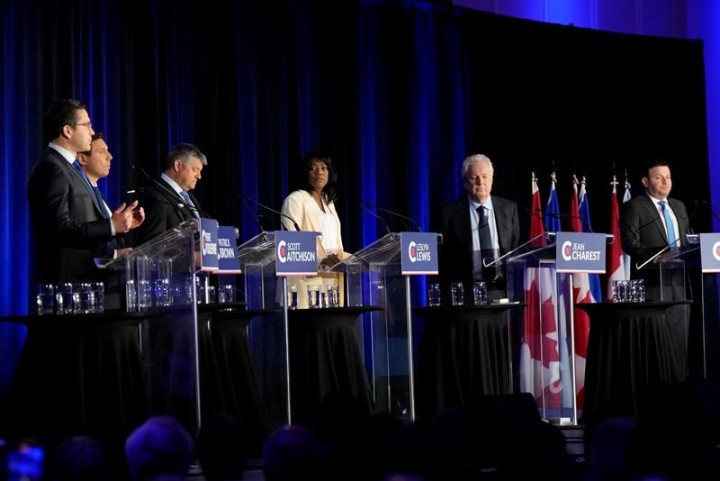LAVAL, Que. — Conservative leadership hopefuls are squaring off — in French — in the second official debate of the race, which is being held in Laval, Que.
Here are the latest developments. All times eastern:
8:55 p.m.
Conservative leadership candidates Patrick Brown and Leslyn Lewis took turns attacking rival Pierre Poilievre for his embrace of the cryptocurrency Bitcoin as a solution to inflation.
Lewis, who is often reading from her notes during the French-language debate in Laval, Que., said Poilievre’s position was wrong.
At one point, Brown said Poilievre’s position on Bitcoin was similar to that of the leadership in El Salvador, which adopted Bitcoin as legal tender.
The International Monetary Fund urged the Central American country to drop Bitcoin as its official currency earlier this year, citing its volatility.
___
8:20 p.m.
Former Quebec premier Jean Charest says Canada must renegotiate the Safe Third Country Agreement with the United States.
He says that is how he would deal with “illegal immigration,” such as migrants entering the country through the unofficial border crossing at Roxham Road south of Montreal.
Candidates were asked about immigration as the first question in the debate.
Brampton Mayor Patrick Brown used the question to say he was trying to build an inclusive party and attacked Ottawa-area MP Pierre Poilievre for not publicly condemning the “white replacement” conspiracy theory espoused by Pat King, a leader of the Ottawa convoy protest.
Poilievre responded by saying he has in fact condemned King’s remarks and that people couldn’t believe anything Brown says.
While answering a question about public safety, Poilievre said the country needs to better deal with guns illegally brought into Canada.
Charest said Poilievre has no businesses talking about law and order when he supported the Ottawa convoy, which he called an illegal blockade.
The room then erupted into a mix of cheers and boos.
___
8:10 p.m.
Candidates took to the stage and began by outlining one by one what legacy they wanted to leave behind as leaders.
Pierre Poilievre says he wants his legacy to be making Canada the freest country in the world, including by making sure people don’t feel forced to get vaccinated and that young people are able to afford a home.
Patrick Brown says he can win in urban areas, which the party needs, and has what it takes to build a party that can succeed in a general election.
Roman Baber, an Independent member of the Ontario legislature, introduced himself to the crowd.
He says he knows Canada is bilingual and has taken lessons, but still asked those watching to forgive his French.
___
8:05 p.m.
The Conservative party’s leadership organizing committee announced before the debate began that it will announce the results of the leadership race at a downtown Ottawa convention centre on Sept. 10.
The party’s president, Robert Batherson, says it will be the first time since 2018 that members will gather together at a national event.
The party held a convention in Halifax in 2018.
___
7:50 p.m.
House music issued from amplifiers as Conservatives of all ages began to take their seats ahead of tonight’s leadership debate.
Several hundred attendees, who were not wearing masks, crowded the ballroom of the Chateau Royal venue north of Montreal, seated between television cameras and the stage.
The six contenders are slated to appear at their podiums at 8 p.m.
___
7:30 p.m.
Conservative leadership candidates filed in for the race’s only French-language debate, being held at a reception hall north of Montreal.
The suburban venue in Laval, Que., saw scores of federal Tories and onlookers mingling in the foyer before the six contenders take the stage.
Former Quebec premier Jean Charest greeted a handful of supporters with kisses, while Ontario MP Scott Aitchison chatted with party members amid sign-up booths for each candidate.
Bookending the stage beneath ballroom chandeliers were a bank of speakers and 14 flags — six with the Fleur-de-lis, eight with the Maple Leaf.
This report by The Canadian Press was first published May 25, 2022
The Canadian Press
Related


































